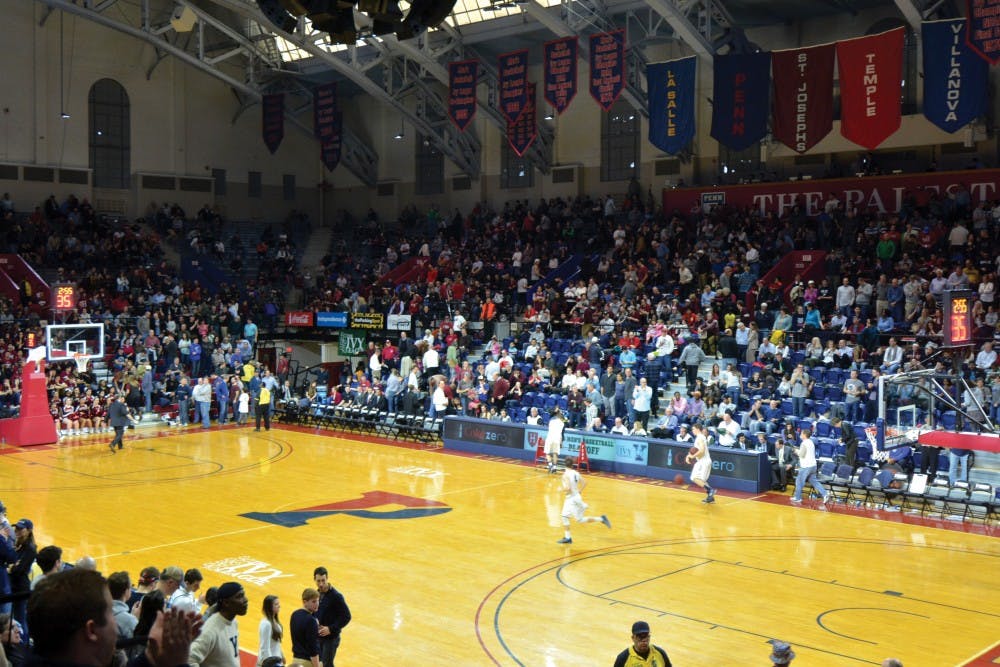The state of Penn Athletics is not strong. Yet.
As the 2014-15 academic year draws to a close, so too do the seasons for Penn Athletics’ spring sports. Within the next week or two, all will be quiet on the Red and Blue front, kicking off a long wait for the fall to roll around, a period in which preparation and training is the closest any team comes to seeing live action.
That the end is near is a damn shame. Because if Penn’s late-winter and spring seasons were a glimpse into the University’s athletic future, what comes next for the Quakers cannot arrive soon enough.
Over the course of less than three months, a handful of teams have demonstrated that the state of Penn Athletics is, if not strong, well on its way to holistically reasserting Penn as a dominant force in the Ivy League.
Since mid-February, three teams have captured Ivy titles, a total matching or higher than the output from each of the final three seasons of former Athletic Director Steve Bilsky’s tenure.
A worst-to-first transition under coach Bob Heintz placed men’s golf in the winner’s circle — for the first time since 2012 — at the Ivy League Championships last weekend, while the oft-overlooked gymnastics squad clinched the Ivy Classic title at the Palestra in late February. All of this came on the heels of women’s squash’s dazzling campaign, one in which the Quakers finished undefeated in the Ancient Eight, reached as high as No. 2 in the nation and lost only three matches ... by a total of three measly points.
With five teams still in the hunt for Ivy titles heading into the weekend, not to mention a strong core of rowers poised to make waves (pun intended) at the IRA Championships at the end of May, that total could still rise. It would come as no surprise if Tory Bensen and Meg Markham — the Ivy League’s Attacker and Defender of the Year, respectively — added another championship to women’s lacrosse’s already loaded trophy case, or if Ronnie Glenn and Jake Cousins pitched the baseball team to the College World Series.
Naturally, no matter how the end of the season plays out for the Red and Blue, championships alone cannot define Penn Athletics. To only look at the numbers at the end of the year would do a disservice to the progress Athletic Director Grace Calhoun has made in her first year at the helm.
In order for the athletic administration to provide its students with the “model student-athlete experience,” as she terms it, the focus needs to go beyond simply aiming for championships. For all intents and purposes, in 2014-15 it clearly did.
Between her own hiring, the hiring of new basketball coach Steve Donahue or simply in private conversations, Calhoun emphasized that her first year on the job was always going to be one of discovery. Learning about Penn. Learning about what each team needed in order to improve. Learning how to make the necessary changes for each program.
In conducting this evaluation, it seems as if Calhoun is actually aware of how to reinvigorate the athletic community at Penn.
“Where we could make well-informed, calculated change, we did,” she said earlier this month. “Where we need to do our due diligence to make sure we get it done the right way, we are taking some time. We know that we need to modernize to move forward, that progress means having change.”
One needs to look no further than Calhoun’s three coaching hires to feel confident about the athletic department moving forward. In each situation, the athletic director brought in a new face that either generated a winning culture right away — as was the case for wrestling boss Alex Tirapelle, who sent five grapplers to NCAA Championship’s last month — or gave off an impression of steady leadership moving forward. Tellingly, few are less optimistic about the future of Penn basketball now than they were on March 10.
In replacing Bilsky, it was unfair to demand too much of Calhoun in 2014-15. After all, the current executive director of the Big 5 didn’t exactly leave his successor with a program firing on all cylinders.
And for the first few months, this year featured plenty of bumps in the road for Penn Athletics. The football team went 2-8, men’s soccer failed to repeat its Ivy title win and Jerome Allen’s squad lost a program-worst seven consecutive Ivy games.
Perhaps, given the outcome of the spring, that is the silver lining. With men’s tennis demonstrating that it can recruit effectively against other Ivy powers, women’s basketball guaranteed for an Ivy title push next year and virtually all spring sports contending for championships, this could be just the beginning.
Under the leadership of Ray Priore and Donahue, respectively, there is reason to believe that Penn football and basketball will — in the near future — earn their given status as the Quakers’ marquee programs once again. That improvement, combined with the success seen this spring, positions Penn Athletics as a whole to compete with Princeton and Harvard in coming years.
Throw in a resurfacing of the track at Franklin Field, a rumored multi-million dollar investment in new squash courts and a focus on developing corporate sponsorships with Coke and Nike, and the administration has reason to believe that it will be able to recruit and keep sufficient talent on the field throughout Calhoun’s tenure. Without a doubt, the Quakers can capitalize on the momentum established thus far in 2015 to continue to increase their standing in the Ivy League.
The state of Penn Athletics is not strong. Yet.
But if this spring is just the beginning of continued success in 2015-16, it will be difficult to find a weak link in that chain moving forward.



